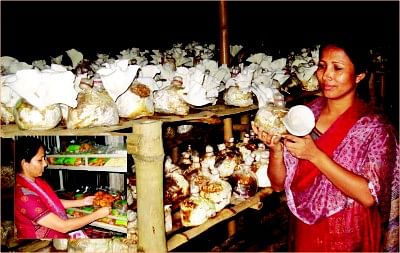Mushroom snacks win hearts

Morsheda Akter Lipi shows a mushroom plant at a culture centre next to her snacks factory in Tangail. Inset, She shuffles through the racks of packed snacks that she made in her factory. Photo: Mirza Shakil
With the will, confidence, perseverance and hard work to make things happen, Morsheda Akter Lipi of Tangail has proved that she can accomplish anything she puts her heart to.
From once combating unemployment, Lipi has now taken the reins in her hand by establishing her own little venture.
She runs a small food processing factory, producing various delicious snacks with mushrooms.
Right next to her factory is a shack where she produces mushroom spawns for use in her factory and to sell outside. Many small mushroom growers in the area purchase mushroom spawns from her and sell the final produce to her as well.
She first began the initiative -- Himel Mushroom Cultivation Project -- to make mushroom seeds (spawn) in Tangail in 2005. There was no looking back for her since then.
The snacks she prepares have become quite popular with the people in her district and many areas across the country.
Some of the items that she and her workers produce in her factory include biscuits, pickles and cakes, all made of mushroom.
Lipi's farsightedness has given her fame and recognition. She received the City Small Entrepreneur Award-2010 on September 17 in Dhaka.
The mushroom is a vegetable, which is highly nutritious, tasty and has medicinal qualities.
It boasts of 25-35 percent protein, 50-70 percent vitamins and minerals, 5-6 percent fat and 4-6 percent glucose, with properties that strengthen the immune system of the human body.
Mushrooms are also used to help control high blood pressure, diabetes, gastric, constipation, jaundice and heart ailments, experts say.
About 2,000 varieties of mushroom are found in the world, six of which are edible. The Oyster Hybrid variety mushroom is cultivated in Bangladesh.
Lipi, also a director of Himel Mushroom Cultivation Project and member of Bangladesh Mushroom Foundation, said around 100 mushrooms growers in different parts of the district are involved in the business of farming mushrooms and they all used to collect seeds (spawn) from the Mushroom Cultivation Project in Savar, Dhaka.
This process was quite expensive for small farmers, she said. “I launched my project to supply seeds at a cheaper rate to the mushroom growers in the district."
The availability of mushroom seeds on a commercial basis actually spurred the growth of mushroom cultivation in several places, including Sadar, Madhupur and Kalihati upazilas in 2006.
Many unemployed youths showed keen interest in mushroom cultivation, to learn a new farming skill. Lipi has trained around 200 people, including students and unemployed youths.
Lipi, who has received training on mushroom cultivation as well, said people's concept of mushrooms is changing. Its cultivation is likely to be a profitable business as more and more people are using it in their kitchens to prepare tasty dishes.
However, more than 100 mushroom farms were closed in the district in last few years due to several reasons, including a lack of funds and marketing facilities, says Jasim Ahmed, former general secretary of Mushroom Growers' Association in Tangail. However, Lipi is an exception, he adds.
Lipi says she is determined to continue her project, despite odds. “I am going to continue with my project as demand for mushrooms is increasing at home and abroad,” she adds.
At present, in addition to spawn production, she is running a small factory in the Deola area in Tangail town where she makes different snacks with mushrooms.
Lipi took out an SME loan worth Tk 10 lakh from Mutual Trust Bank, Kaliganj branch, in Gazipur in November 2010 to invest in her factory.
The small factory employs eight people, including six women. They supply the snacks to many parts across Bangladesh, including Tangail, Dhaka, Bogra, Khulna, Bagerhat and Jessore.
To meet the demand for mushroom in her factory, she has to source from outside her culture centre as well. Housewives Lutfa Begum, 30, of Birpushia village in Sadar upazila, and Swapna Akhter, 25, of Jalchhatra village in Madhupur upazila, cultivate mushroom in their homes on a small scale and supply raw mushrooms to Lipi's factory.
“Earlier, many youths showed interest in mushroom cultivation but their main problems were training and funding,” she says.
“These problems are not that big now as many commercial banks and non-government organisations are willing to provide credit to the mushroom growers. In addition, the growers can always sell their produce to my factory,” Lipi adds.
Osman Khan, deputy director of Department of Agricultural Extension, says mushroom cultivation is gaining popularity in the district in recent times. It is mostly the unemployed youths who are interested, he adds.
“We are encouraging the industry as mushroom is able to meet nutrition demands and its cultivation can help cut unemployment,” he says.

 For all latest news, follow The Daily Star's Google News channel.
For all latest news, follow The Daily Star's Google News channel. 



Comments